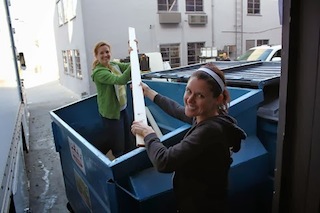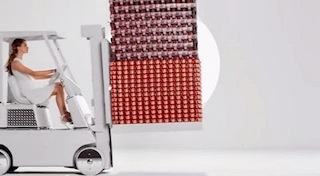 A new series of ads for Target were recently shot on minimalistic all-white sets at Hollywood Center Studios and yet rank among the most environmentally friendly spots ever produced on the nearly 100-year-old lot. Virtually all of the sets, props, wardrobe, and discards (such as food waste from catering and craft services) were earmarked for reuse, recycling or composting. It’s estimated that nearly four tons of potential waste products were diverted from local landfills on these two projects due to the production’s adoption of eco-friendly production practices.
A new series of ads for Target were recently shot on minimalistic all-white sets at Hollywood Center Studios and yet rank among the most environmentally friendly spots ever produced on the nearly 100-year-old lot. Virtually all of the sets, props, wardrobe, and discards (such as food waste from catering and craft services) were earmarked for reuse, recycling or composting. It’s estimated that nearly four tons of potential waste products were diverted from local landfills on these two projects due to the production’s adoption of eco-friendly production practices.
EcoSet, a Los Angeles company that helps film productions limit their environmental impact, has been working with Target for nearly five years to reduce the amount of waste generated during the making of its television commercials and marketing events. The company arranges for sets, wardrobe items and props to be donated to worthy organizations, or given to members of the public for reuse. During shoots, EcoSet is like another department on set, seeking ways to reduce waste and ensuring that items that can’t be reused, like plastic bottles and food, are recycled or composted.
“Eighty-five to 95 percent of what normally gets thrown away by crew is not waste,” explains Kris Barberg, EcoSet’s executive director. “We strive for 90-percent or higher diversion from landfills, and average 93-percent across the board.”
 Waste in film production has historically been a problem, notes Barberg. Constructed sets and props are often used once and then tossed out. It’s not the result of indifference, but rather because crews are busy and a system isn’t in place to manage such items in an environmentally responsible way. That’s where EcoSet comes in. The company donates furniture and home goods to groups involved in providing housing for veterans and the homeless. Clothing is similarly donated to non-profits that serve women and children. The company also runs a Community Resource Center where non-profit groups, artists and members of the public can look through the bounty of discarded set items for things they can reuse and repurpose. Examples include lumber, set walls, flooring, carpet, signage, custom props, packaging materials, lighting gels, and countless bits and scraps of random materials.
Waste in film production has historically been a problem, notes Barberg. Constructed sets and props are often used once and then tossed out. It’s not the result of indifference, but rather because crews are busy and a system isn’t in place to manage such items in an environmentally responsible way. That’s where EcoSet comes in. The company donates furniture and home goods to groups involved in providing housing for veterans and the homeless. Clothing is similarly donated to non-profits that serve women and children. The company also runs a Community Resource Center where non-profit groups, artists and members of the public can look through the bounty of discarded set items for things they can reuse and repurpose. Examples include lumber, set walls, flooring, carpet, signage, custom props, packaging materials, lighting gels, and countless bits and scraps of random materials.
Not everything can be easily repurposed. “Custom-built walls, sets and huge props can be challenging,” Barberg observes. “Right now, we have an enormous Plexiglass ‘R’ in our CRC. Who needs an 8-foot-tall ‘R’?”
For the Target campaign, EcoSet provided space for the production company, A White Label Product, to store its custom-built white sets. The campaign included a number of spots shot on different days, several weeks apart. Had storage space not been available, A White Label Product may have had to rebuild new sets for each ad.
EcoSet also worked closely with Hollywood Center Studios’ management in executing its plan. The company needed to bring in special dumpsters and hauling services to properly manage waste products. “Hollywood Center’s staff were very accommodating and supportive,” Barberg recalls. “They made special allowances to let us do what we do.”
Hollywood Center Studios has a strong commitment to environmentalism. It runs its own recycling program and recently installed solar panels on the roofs of two sound stages that supply part of the electricity needed to run them. “We are very impressed with the work that EcoSet is doing and hope that more producers adopt environmentally-friendly production practices,” says Richard Schnyder, Hollywood Center Studios’ vice president of sales. “We believe that environmentalism is not only good for our community and the planet, it’s good business practice.”
Remaining food products from Target’s Everyday Collection campaign were donated to multiple non-profits in Los Angeles
Hollywood Center Studios www.HollywoodCenter.com
